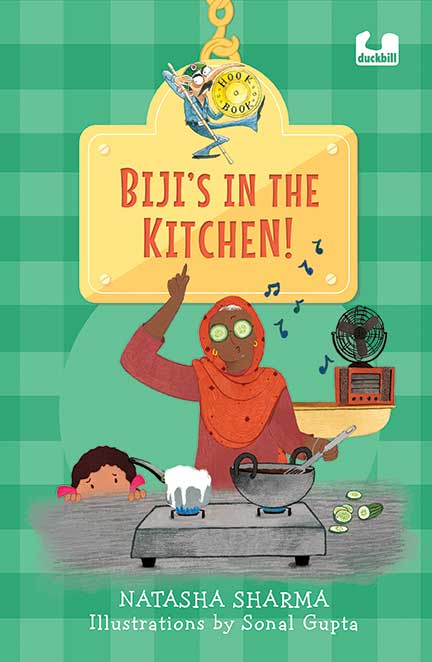Chintan Girish Modi
If you are an English language teacher or librarian who is always on the lookout for books to entice reluctant readers, Natasha Sharma’s new book Biji’s in the Kitchen! is worth giving a shot. The author spins an engrossing tale that will make readers chuckle, roll their eyes, and wish that the characters were people that they could meet someday in flesh and blood.
Published by Duckbill Books, it is part of their “hook book” series. It is meant to be a transition between picture books and early chapter books. The plot is easy to follow and accompanied by illustrations that are not literal but add texture to the characters.
The story revolves around an adorable grandmother, who is called Biji in Punjabi. It is narrated by her granddaughter, who remains unnamed in the book but appears on several pages in a pink frock with matching pink ribbons in her neatly braided hair. What makes Biji special is that she is neither a strict disciplinarian nor someone who smothers people with her affection. She is in her element when she creates new things, without worrying much about the eventual outcome. Unfortunately, her culinary experiments are often quite disastrous.

Her granddaughter recalls the time when Biji made lauki halwa. “My teeth got stuck to each other because the halwa was so sweet and sticky. I held my breath, tried not to squish my face, swallowed a bite and quickly drank a glass of water.” It is humbling to see how Biji does not try to defend herself when she makes a mistake. After eating a plateful of the dessert, she announces, “Oh! That was terrible!” This is a wonderful moment because adults often pretend to be infallible and this puts pressure on children to be perfect all the time.
When Biji is asked if she would like to follow a recipe book, she says, “Cooking must be freestyle and fun!” She never gives up. While the food she makes is often inedible, her persistence is a quality that is worth emulating. This book also busts the stereotype that all women ought to be great cooks because feeding others is deemed to be their responsibility. Biji has other skills. She loves to take her granddaughter “vrooming on a motorbike” through old, narrow streets, where they devour gobi and paneer pakoras as well as thick creamy lassi.
Biji’s enthusiasm for learning new things makes her even more endearing. When her English-speaking granddaughter introduces her to the simile “as cool as a cucumber”, Biji says, “Are you calling me a kheera?” She asks the narrator to teach her English so that she can keep pace with the young generation. In addition to this, Biji loves dressing up. She has shiny bottles of cosmetics on her dressing table. Her granddaughter is not allowed to touch these but has permission to go through the drawers used to store jooda pins, combs, tweezers, and bindis.
This book has great potential to be turned into a skit in schools that celebrate Grandparents’ Day. Teachers could also encourage students to share about their grandparents and what makes them unique, either through a writing exercise or a speaking activity in small groups.
Sonal Gupta’s illustrations are a sight to behold. They recreate the experience of being in Amritsar through cultural references in terms of attire, street scenes, the Gurmukhi script on shopfronts, phulkari prints, and hand fans made of cloth. The most charming illustrations are the ones where Biji is juggling onion rings, wearing skates, quietly eating a cucumber slice placed on her eyelid, licking a moustache made of creamy lassi on her upper lip, and spreading homemade mango chutney on toast.
The book is priced at Rs. 199. The publisher recommends it for readers who are 5 and above. Teachers who want to use the book as a resource to cover topics in their language curriculum will find it helpful when they teach descriptive writing, the use of adjectives, and synonyms.
The author is a freelance journalist, writer, and book reviewer who used to be a school teacher in the not-so-distant past. He can be reached at chintan.writing@gmail.com.
